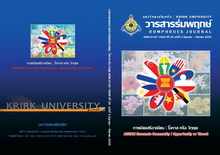การก้าวสู่ประชาคมเศรษฐกิจอาเซียน กับการเสริมพลังผู้สูงอายุไทยให้เป็นพลังทางเศรษฐกิจและสังคม
Main Article Content
Abstract
ผลการศึกษาวิจัย พบว่า สังคมไทยได้ก้าวเข้าสู่สังคมผู้สูงอายุแล้ว ภายใต้ความจำกัดและไม่เพียงพอของสวัสดิการของภาครัฐนั้น ชุมชนและท้องถิ่นกลับมีบทบาทเติมเต็มสำคัญในการขับเคลื่อนกระบวนการในการรับมือสังคมผู้สูงอายุ โดยอาศัยฐานของ “ทุน” ประเภทต่างๆ ที่มีอยู่ในชุมชน คือ ทุนทางสังคมวัฒนธรรม ทุนทางเศรษฐกิจ ทุนมนุษย์ (เช่น ผู้นำการเปลี่ยนแปลง) ทุนสัญลักษณ์ และทุนที่เป็นทรัพยากรธรรมชาติ ด้วยกระบวนการทางสังคมที่วางอยู่บนฐาน “ทุน” ที่ชุมชนมีนำไปสู่การนิยามตัวตนใหม่ของผู้สูงอายุไทยในฐานะที่ทำ ประโยชน์ให้กับส่วนรวม เป็นพลังในการขับเคลื่อนสังคม (active aging) เพื่อการเสริมสร้างผู้สูงอายุให้เป็นพลังทางเศรษฐกิจและสังคมของไทย
Towards the Asean Economic Community and the Empowering of Thai Elderly Socio-Economics
The objectives of this doctoral dissertation were : 1) to present the details of the comprehensive categories and positive attitudes to build up assurance for the elderly to believe in their worthy living and their benefits to society and empowering them to live with confidence, and 2) to address to Thai society and other concerning sectors to have positive attitudes towards the elderly and perceive them as the asset not the liability. That was to say, the elderly were not the people who waited for the state-welfare. On the other hand, they were able to manage and earn their living by their wisdom and precious experiences. They also possessed with socio-cultural assets of local community which could be developed as the social measures to cope with the Thai aging society.
The research findings showed that, Thailand has recently become aging society. Rather than depending on welfare system runs by the state, local government and community could play the important roles by employing the various forms of assets within the local area as the instruments to build up the activities for the aging. The existing assets could be categorized as the followings: social assets (i.e. social network of senior associations, social interaction, the trust, etc.) cultural assets (local knowledge and wisdom) economic assets; human assets; symbolic assets (fame and prizes) and natural assets (nature, environment, plentiful natural resources and ecosystem). 3) The social processes that were based on these “assets” help support the aging people as active aging.
Article Details
Every article published in the Romphruek Journal of the Humanities and Social Sciences is the opinion and point of view of the authors. Thery're not the viewpoint of Krirk University or the editored department. Any part or all of the articles for pablication must be clearly cited.

